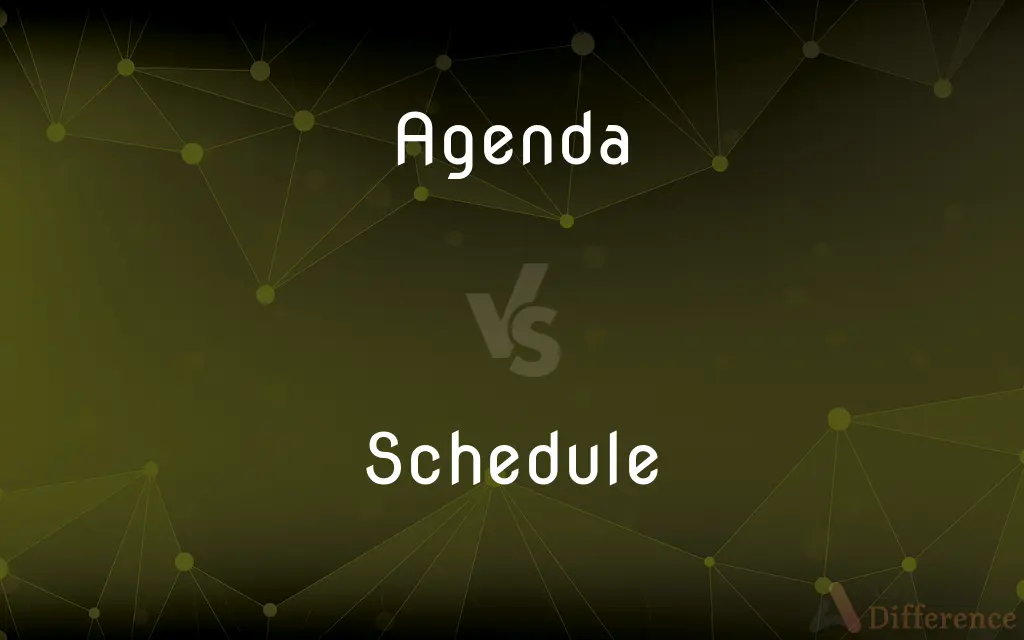Agenda vs. Schedule — What's the Difference?
By Urooj Arif & Maham Liaqat — Updated on March 11, 2024
An agenda lists topics or activities to be discussed or addressed in a meeting, focusing on items and their order, while a schedule outlines tasks or events with specific times and dates, emphasizing timing and sequence.

Difference Between Agenda and Schedule
Table of Contents
ADVERTISEMENT
Key Differences
The term "agenda" is commonly associated with meetings, conferences, or similar gatherings. It serves as an outline of subjects or issues to be discussed, often in a sequential order, but without specifying exact times for each item. A "schedule," on the other hand, is a detailed plan that allocates specific times and often locations for various tasks or events. It is more time-oriented than an agenda and can apply to a wide range of contexts, from daily work routines to comprehensive project timelines.
An agenda's main purpose is to ensure that all necessary topics are covered, facilitating organized and productive discussions. For instance, a board meeting agenda might list items like "Budget Review," "Policy Updates," and "New Project Proposals," guiding the meeting's flow. A schedule is crucial for time management, helping individuals and organizations coordinate activities and resources efficiently. For example, a conference schedule would include not only the topics of sessions but also their start and end times, locations, and possibly the speakers involved.
While an agenda is more about what needs to be discussed or achieved, a schedule is about when and where these discussions or activities will take place. In some cases, especially for structured meetings or events, an agenda might be combined with a schedule, providing a detailed framework that includes both the topics for discussion and their allotted times.
The distinction between an agenda and a schedule is significant for planning and organizing. Understanding and utilizing these tools effectively can enhance productivity, ensure better time management, and facilitate clearer communication within teams and organizations.
Comparison Chart
Focus
Topics or items for discussion
Time and sequence of events or tasks
ADVERTISEMENT
Detail
Lists items without specific times
Includes specific times and often locations
Purpose
To outline subjects to be addressed in a meeting or session
To plan and manage time for various tasks or events
Context
Meetings, conferences, discussions
Daily activities, projects, events
Example
Board meeting agenda: Budget Review, Policy Updates
Conference schedule: 9 AM - Keynote Speech, 10 AM - Workshop A
Compare with Definitions
Agenda
An agenda is a list of topics to be discussed in a meeting.
The meeting's agenda includes a review of quarterly sales figures.
Schedule
A schedule is a plan that assigns specific times to tasks or events.
Her daily schedule includes gym time at 7 AM and meetings starting at 9 AM.
Agenda
Agendas help meetings stay focused and productive.
Thanks to a clear agenda, the meeting concluded efficiently within an hour.
Schedule
Schedules can be detailed, including locations and participants.
The conference schedule listed session times, rooms, and speakers.
Agenda
It organizes discussion points to ensure all topics are covered.
The team added Future Goals to the agenda for a comprehensive discussion.
Schedule
Schedules are often strict to ensure timely completion.
The exam schedule was fixed, with no room for changes.
Agenda
They often follow a logical or thematic order.
The agenda started with current issues before moving to new proposals.
Schedule
It helps in managing time effectively across activities.
The project schedule outlined each phase's start and end dates.
Agenda
Agendas can be flexible, adjusting to the meeting's flow.
The chairperson skipped some agenda items due to time constraints.
Schedule
They are essential for coordinating multiple tasks or events.
The production schedule synchronized the work of different departments.
Agenda
A list of things to be discussed in a meeting.
Schedule
A schedule or a timetable, as a basic time-management tool, consists of a list of times at which possible tasks, events, or actions are intended to take place, or of a sequence of events in the chronological order in which such things are intended to take place. The process of creating a schedule — deciding how to order these tasks and how to commit resources between the variety of possible tasks — is called scheduling, and a person responsible for making a particular schedule may be called a scheduler.
Agenda
A program of things to be done or considered
"King's broadening of the civil rights agenda to include issues of class, income, and employment" (James Carroll).
Schedule
A plan for carrying out a process or procedure, giving lists of intended events and times
We have drawn up an engineering schedule
Agenda
(Informal) A usually unstated underlying motive
"Everyone has an agenda, whether he or she is honest about it or not" (Ted Nordhaus and Michael Shellenberger).
Schedule
An appendix to a formal document or statute, especially as a list, table, or inventory
They need a clear schedule of fixtures and fittings
Agenda
A datebook
Bought a leather-bound agenda.
Schedule
(with reference to the British system of income tax) any of the forms (named ‘A’, ‘B’, etc.) issued for completion and relating to the various classes into which taxable income is divided.
Agenda
A plural of agendum.
Schedule
Arrange or plan (an event) to take place at a particular time
The release of the single is scheduled for April
Agenda
A temporally organized plan for matters to be attended to.
Schedule
Include (a building or site) in a list for legal preservation or protection
Cowley Bridge has already been scheduled and protected as an ancient monument
Agenda
A list of matters to be taken up (as at a meeting).
Schedule
A list of times of departures and arrivals; a timetable
A bus schedule.
A schedule of guided tours.
Agenda
A notebook used to organize and maintain such plans or lists, an agenda book, an agenda planner.
Schedule
A plan for performing work or achieving an objective, specifying the order and allotted time for each part
Finished the project on schedule.
Agenda
An ulterior motive.
Schedule
A printed or written list of items in tabular form
A schedule of postal rates.
Agenda
(obsolete) A ritual.
Schedule
A program of events or appointments expected in a given time
Can you fit me into your schedule Tuesday afternoon?.
Agenda
Plural of agendum
Schedule
A student's program of classes.
Agenda
A temporally organized plan for matters to be attended to.
Schedule
A supplemental statement of details appended to a document.
Agenda
A list of matters to be discussed (as at a meeting).
Schedule
A federally regulated list of controlled substances, ranked in classes by potential for abuse.
Agenda
A motive or set of goals; as, to have one's own agenda;
Schedule
One of the ranks or classes in such a list.
Agenda
A temporally organized plan for matters to be attended to
Schedule
To enter on a schedule
Calculate and schedule each tax deduction on the proper form.
Agenda
A list of matters to be taken up (as at a meeting)
Schedule
To make up a schedule for
I haven't scheduled the coming week yet.
Schedule
To plan or appoint for a certain time or date
Scheduled a trip in June.
Was scheduled to arrive Monday.
Schedule
To list or rank (a controlled substance) in a schedule.
Schedule
(obsolete) A slip of paper; a short note.
Schedule
(legal) A written or printed table of information, often forming an annex or appendix to a statute or other regulatory instrument, or to a legal contract.
Schedule of tribes
Schedule
One of the five divisions into which controlled substances are classified, or the restrictions denoted by such classification.
A Schedule I drug with a high potential for abuse
Schedule
A serial record of items, systematically arranged.
Schedule
A procedural plan, usually but not necessarily tabular in nature, indicating a sequence of operations and the planned times at which those operations are to occur.
Stick to the schedule
We're running behind schedule
Things are happening ahead of schedule
Schedule
(computer science) An allocation or ordering of a set of tasks on one or several resources.
Schedule
To create a time-schedule.
Schedule
To plan an activity at a specific date or time in the future.
I'll schedule you for three-o'clock then.
The next elections are scheduled on the twentieth of November.
Schedule
To add a name to the list of people who are participating in something.
I am scheduled for classes next month.
Schedule
To admit (a person) to hospital as an involuntary patient under a schedule of the applicable mental health law.
Whether or not to schedule a patient
Schedule
(US) To classify as a controlled substance.
Schedule
A written or printed scroll or sheet of paper; a document; especially, a formal list or inventory; a list or catalogue annexed to a larger document, as to a will, a lease, a statute, etc.
Schedule
To form into, or place in, a schedule.
Schedule
A temporally organized plan for matters to be attended to
Schedule
An ordered list of times at which things are planned to occur
Schedule
Plan for an activity or event;
I've scheduled a concert next week
Schedule
Make a schedule; plan the time and place for events;
I scheduled an exam for this afternoon
Common Curiosities
How do agendas and schedules work together in a conference?
In a conference, the agenda sets the topics for each session, while the schedule provides the timing, duration, and location of these sessions.
Is a schedule only used for events?
No, schedules can be used for a wide range of planning needs, from daily work routines to long-term project timelines.
Is an agenda necessary for every meeting?
While not every casual meeting may require a formal agenda, having one helps in maintaining focus, especially in formal or business settings.
Can technology help in managing agendas and schedules?
Yes, various software and applications are designed to create, share, and manage agendas and schedules, enhancing collaboration and efficiency.
Can an agenda include time allocations?
While agendas primarily list discussion topics, they can sometimes include rough time estimates for each item but are generally less specific than schedules.
Are there different types of schedules?
Yes, schedules can range from daily planners to complex project management timelines, each serving different levels of planning and coordination needs.
Can a schedule change once it's set?
While schedules are meant to be adhered to, they can be subject to changes due to unforeseen circumstances, although this might affect subsequent plans.
How detailed should a schedule be?
The detail in a schedule can vary depending on its purpose, from high-level overviews to minute-by-minute plans for complex projects or events.
How can one effectively prepare an agenda or schedule?
Understanding the meeting's goals or the project's requirements is crucial, as is consulting with participants or team members to ensure inclusivity and relevance.
What happens if items on an agenda are not covered?
Uncovered items may be deferred to the next meeting or handled through other communication channels, depending on their urgency and importance.
Share Your Discovery

Previous Comparison
Patent vs. Trademark
Next Comparison
Slope vs. GradientAuthor Spotlight
Written by
Urooj ArifUrooj is a skilled content writer at Ask Difference, known for her exceptional ability to simplify complex topics into engaging and informative content. With a passion for research and a flair for clear, concise writing, she consistently delivers articles that resonate with our diverse audience.
Co-written by
Maham Liaqat















































